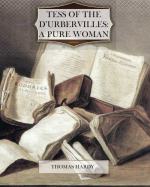|
|
Tess of the d'Urbervilles Author/Context
Thomas Hardy was born in Dorset, England, in 1840 into the family of a wealthy stonemason. Hardy's family had once upon a time been noblemen, but their wealth disappeared, as the d'Urbervilles in this novel. He was trained as an architect, but his passion was poetry. His first attempts at publication were rejected, but he continued to write verse and eventually moved into writing novels. His first novel was also refused, but he had success with his second novel, Under the Greenwood Tree (1872), published as serial articles in magazines (Dickens style).
Hardy went on to establish himself as a serious novelist who "depicted human existence as a tragedy determined by powers beyond the individual's command, in particular the external pressures of society and the internal compulsions of character." He chose topics that were risqué to the Victorian audience he wrote for, and as a result, "his work was often compromised by the demands of popular taste. He consistently veiled the morally volatile situations in his novels with ambiguous description." The public viewed his novels as jarring and sometimes perverse because he used his work to satirize the values of his contemporary society and deal with sexual issues.
Tess of the d'Urbervilles (1891), with its original subtitle, "A Pure Woman Faithfully Presented," along with Hardy's following novel, Jude the Obscure (1895), met with such harsh criticism from the public that in 1896 Hardy gave up writing novels in favor of writing poetry again. He published WessexPoems (1898), Poems of the Past and Present, and The Dynasts (1901, and 1903 to 1908) before he died in 1928. His heart was buried in the Wessex countryside, and his ashes were placed next to Charles Dickens's in the Poet's Corner of Westminster Abbey.
Among his other well know works were: A Pair of Blue Eyes (1873), Far From the Maddening Crowd (1874), The Return of the Native (1878), and The Mayor of Casterbridge (1886).
Hardy's well-developed characters are an important aspect of his work. Their psychological development makes them memorable. Virginia Woolf said that "[his characters] have a force in them which cannot be defined, a force of love or hate, a force which in the men is the cause of rebellion against life, and in the women implies an illimitable capacity for suffering, . . . This is the tragic power; and, if we are to place Hardy among his fellows, we must call him the greatest tragic writer among English novelists."
Bibliography
Hardy, Thomas. Tess of the d'Urbervilles. Bantam Books: New York, 1971.
"Hardy, Thomas." Twentieth-Century Literary Criticism. Vol. 4. Gale Research: Detroit, 1981.
Woolf, Virginia. "The Novels of Thomas Hardy," in her The Second Common Reader. Harcourt: 1932, pp. 266-80.




